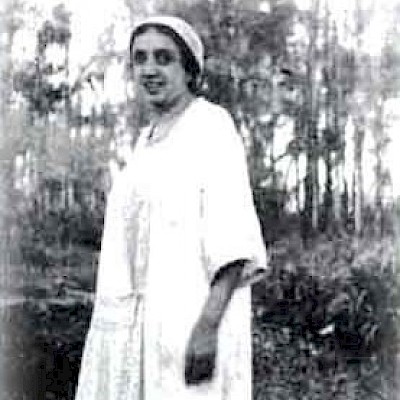Josefa Rosalía del Corazón de Jesús Luque Álvarez (18-3-1893, 31-7-1965) was born in the city of Villa del Rosario, province of Córdoba, in the Argentine Republic, on March 18, 1893, being her parents Don Rafael Eugenio Luque and Doña Dorotea Álvarez. Educated at the College of Discalced Carmelites in the city of Córdoba.
Having as a moral and spiritual base the inner cultivation, the "knowledge" of oneself and the intimate union with the Divinity through meditation, regarding the individual in particular; and to the dissemination of the Christian ideal by the example and dissemination of the Works.
In the year 1.910, he obtained the first prize and diploma for his work "Lauros y Palmas", in the contest that, in commemoration of the centenary of the revolution, was organized by the Ladies of Providence Society and sponsored by the National University of San Carlos, The government of the province and municipality of the capital of Córdoba.
Circumstances of life led her to live in the city of Buenos Aires, where she collaborated with her prose and poetry in Christian spiritual magazines.
In approximately 1932 he settled in the Buenos Aires Delta.
He founded the "Universal Christian Fraternity" School in 1939, in the Neghadá Sanctuary, located on an island in the Argentine Delta.
There he began to write what would later form a beautiful tetralogy: "Origins of the Adamic Civilization", "Eternal Harps", "Summits and Plains", and "Moses", which was the last one finished days before his disincarnation.
Every book or writing is aimed at specific readers. In your case, sincere seekers of Truth, Justice and Love.
What was the determining will: to make known the Messianic teachings and lives of the Guide and Instructor of this earth, and that they were a perfect replica of the Idea of God.
Extracted from what is indelibly recorded in the Archive of Eternal Light.
Like everyone who with effort and sacrifice unravels the wealth of the land by piling up stones and weeds; Thus, the author had to develop her work among the unconsciousness of beings who approached her with different views, not understanding the magnitude of it.
Reading his book "El Huerto Escondido" avoids going into details; in her dialogue with the Christ she unburdens her soul and transcends the pain caused by the misunderstanding of human creatures.
He must not be the best treated disciple than his Master.
Connoisseurs of the Work of Saint Teresa of Jesus establish a parallel between them.
When seeing his Work, we must admire the iron will to achieve it, and to be able to give life to the Christ, among us, reflected in a book.
And with the purpose of making emerge from the depths of our soul the Ideal instilled by our Divine Master: the Fatherhood of God and the Universal Brotherhood; and that in his last life Jesus of Nazareth tried to burn our hearts.
The Divine Law gave the necessary resources to our spirit to awaken the awareness that we integrate a millennial alliance and the duty that corresponds to us at this end of the cycle, and at this decisive hour of our evolution.
The author's personality is diluted by the magnitude of the Work, and is enlarged for having given it life. His spirit is essence in God. Our soul aspires to the same. Peace, hope and love over all beings.
Source: https://elcristoes.net/biografa.htm
